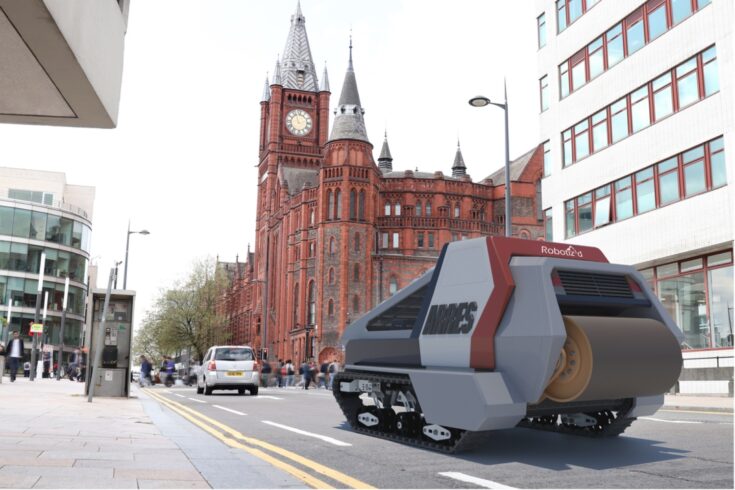A UK start-up has developed the world’s first autonomous robot that uses AI to locate and fix cracks and potholes on UK roads.
Almost two million potholes are fixed on UK roads annually, but with ageing infrastructure, increasing road users and extreme weather conditions, this is only expected to worsen.
Conventional and manual methods for fixing potholes are labour intensive and struggle to cope with this hazardous and costly problem.
World-first technology
Start-up company, Robotiz3d, has developed, and is about to commercialise, world-first technology designed to automate and transform road maintenance, making it faster, safer and more cost-effective.
Located at the Science and Technology Facilities Council’s (STFC) Daresbury Laboratory, Robotiz3d has combined AI with advanced robotics to develop an autonomous vehicle that will locate and fix cracks and potholes in the road.
Using advanced detection and repair technologies incorporated into the AI robotics system, the autonomous vehicle can assess and predict the severity of defects, sealing them before they worsen.
UK patented technology
Based initially on patented research developed at the University of Liverpool, this technology can analyse the geometry of potholes, collecting measurement data as it operates.
Using AI, it couples this data with a unique prediction algorithm that will enable local authorities to predict road conditions accurately, enabling them to prioritise preventative road maintenance.
Ultimately, this will reduce the time, cost, carbon dioxide emissions and material wastage associated with repairing potholes and cracks, while improving the life span and safety of our roads.
From concept to market
At Daresbury Laboratory, located at Sci Tech Daresbury in the Liverpool City Region, Robotiz3d has gained flexible and affordable access to the advanced manufacturing facilities and dedicated business support available on site.
This has included the opportunity to create a bespoke laboratory to develop its prototype, including space for the essential testing of its autonomous vehicle.
With official testing now underway, the company is making substantial progress towards commercialising its technology.
Invaluable business support
Throughout the process, access to dedicated business support, including health and safety requirements and networking opportunities has also been invaluable to Robotiz3d’s progress.
Lisa Layzell, CEO and co-founder at Robotiz3d, said:
This is the first autonomous technology of this kind developed specifically to tackle the pothole crisis which plagues many parts of the country, and which is estimated to have cost more than £1 billion to repair over the last decade.
For Robotiz3d, locating to STFC’s Daresbury Laboratory has provided us with a technologically sophisticated environment to operate in. The expertise available, both in technology and business development, have been invaluable as we move towards the commercialisation phase of our business.
Get involved
Find out more about how STFC supports early stage businesses across the UK.
Read about business incubation opportunities at STFC and how they can benefit your company.
Businesses can apply to be located at Sci-Tech Daresbury, Harwell Campus or the Higgs Centre for Innovation, Edinburgh.

